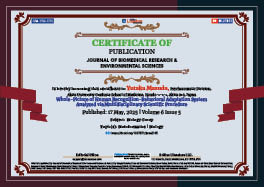Yutaka Masuda*
Volume6-Issue5
Dates: Received: 2025-04-04 | Accepted: 2025-05-13 | Published: 2025-05-17
Pages: 492-502
Abstract
Human recognition-behavioral adaptation system, which corresponds to the physical adaptation system, maintains homeostasis of Human Intelligence, the recognition-behavioral Self and the recognition-behavioral World. The recognition-behavioral adaptation system was studied in the various research fields, however, it was not clearly integrated. Structuralism provides a qualitative research method to analyze the underlying structural patterns of human recognition-behavioral adaptation in the humanities. Systems theory provides a quantitative research method to analyze performance of meta-systems consisting of interrelated and interdependent single-systems in the biological sciences. In the present study, the adaptation system was analyzed via the multidisciplinary scientific procedure integrating the qualitative research method and the quantitative research method. The adaptation system of Human Intelligence was considered to be the language-metabolism system utilizing the single-modeling-codes and the meta-modeling-codes which are formed in Neuronal Network of the brain. The Self is structured corresponding to the complex-network meta-modeling-code and the centroid-hierarchy meta-modeling-code, and it involves the cybernetic feedback system in the structure. The Intelligence-module, the core of the Self, works corresponding to the syllogistic meta-modeling-code. The adaptation system of the World was considered to be the self-reference adaptation system working corresponding to the complex-network meta-modeling-code and the ascending nest-hierarchy meta-modeling-code. Reality of Psychotherapy was reductively explained with the cybernetic feedback system and the self-reference system. Finally, it was concluded that human recognition-behavioral adaptation system is reductively and holistically analyzed via the multidisciplinary scientific procedure.
FullText HTML
FullText PDF
DOI: 10.37871/jbres2105
Certificate of Publication

Copyright
© 2025 Masuda Y. Distributed under Creative Commons CC-BY 4.0
How to cite this article
Masuda Y. Whole-Picture of Human Recognition-Behavioral Adaptation System Analyzed via Multidisciplinary Scientifi c Procedure. J Biomed Res Environ Sci. 2025 May 17; 6(5): 492-502. doi: 10.37871/jbres2105, Article ID: JBRES2105, Available at: https://www.jelsciences.com/articles/jbres2105.pdf
Subject area(s)
References
- Bullmore E, Sporns O. The economy of brain network organization. Nat Rev Neurosci. 2012 Apr 13;13(5):336-49. doi: 10.1038/nrn3214. PMID: 22498897.
- Sarnyai Z, Kovács GL. Role of oxytocin in the neuroadaptation to drugs of abuse. Psychoneuroendocrinology. 1994;19(1):85-117. doi: 10.1016/0306-4530(94)90062-0. PMID: 9210215.
- Fletcher JM, Francis DJ, Morris RD, Lyon GR. Evidence-based assessment of learning disabilities in children and adolescents. J Clin Child Adolesc Psychol. 2005 Sep;34(3):506-22. doi: 10.1207/s15374424jccp3403_7. PMID: 16083392.
- Masuda Y. Meta-model of human recognition-behavioural adaptation system. Integrative Psychological and Behavioral Science. 2024;58:149-159. doi: 10.1007/s12124-023-09781-0.
- Perona MT, Waters S, Hall FS, Sora I, Lesch KP, Murphy DL, Caron M, Uhl GR. Animal models of depression in dopamine, serotonin, and norepinephrine transporter knockout mice: prominent effects of dopamine transporter deletions. Behav Pharmacol. 2008 Sep;19(5-6):566-74. doi: 10.1097/FBP.0b013e32830cd80f. PMID: 18690111; PMCID: PMC2644662.
- Masuda Y. Human self: Structure of the recognition-behavioural model-system working with language-metabolism and Significance induced by symbolical figuring. International Journal of Psychological and Brain Science. 2024;9:30-37. doi: 10.11648/j.ijpbs.20240903.11.
- Masuda Y. Significance of humoral glycolipids produced by patients with a symptomatic diagnosis of major psychoses. Journal of Neuroscience Neuropsychology. 2020;3:108.
- Tarver J, Vitoratou S, Mastroianni M, Heaney N, Bennett E, Gibbons F, Fiori F, Absoud M, Ramasubramanian L, Simonoff E, Santosh P. Development and Psychometric Properties of a New Questionnaire to Assess Mental Health and Concerning Behaviors in Children and Young People with Autism Spectrum Disorder (ASD): The Assessment of Concerning Behavior (ACB) Scale. J Autism Dev Disord. 2021 Aug;51(8):2812-2828. doi: 10.1007/s10803-020-04748-1. Epub 2020 Oct 14. PMID: 33051784; PMCID: PMC8254716.
- Keulers EHH, Hurks PPM. Psychometric properties of a new ADHD screening questionnaire: Parent report on the (potential) underlying explanation of inattention in their school-aged children. Child Neuropsychol. 2021 Nov;27(8):1117-1132. doi: 10.1080/09297049.2021.1937975. Epub 2021 Jun 11. PMID: 34114931.